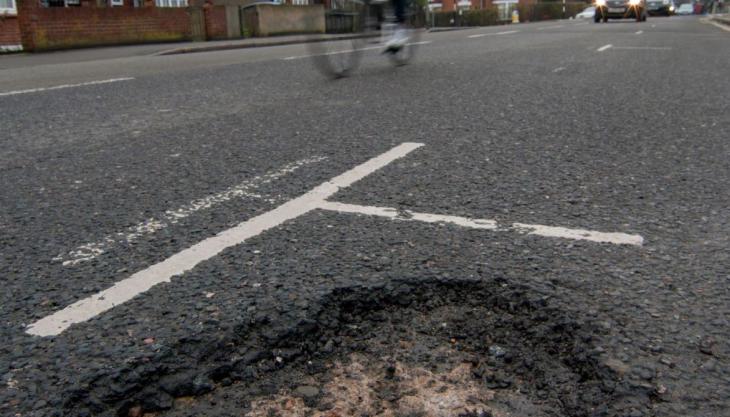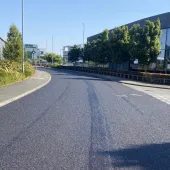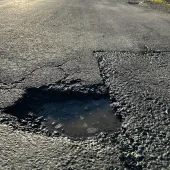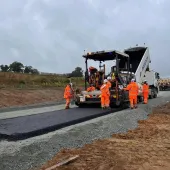Local roads repair backlog tops £12 billion

ALARM survey 2022 highlights the scale of worsening issue faced by highways engineers
THE backlog* of carriageway repairs to fix local roads in England and Wales has reached £12.64 billion, compounded by increased costs caused by rising inflation, reports this year’s Annual Local Authority Road Maintenance (ALARM) survey.
The ALARM survey, published today [22 March] by the Asphalt Industry Alliance (AIA), highlights the scale of the worsening issue faced by highway engineers who have to make difficult choices about keeping local roads open and safe versus improving overall conditions.
Despite an increase in average highway maintenance budgets (up 4% on 2020/21), the proportion being invested in the carriageway itself is down and the reported backlog of carriageway repairs has increased by almost a quarter (23%) on last year’s figure to £12.64 billion – or £61,700 for every mile of local road in England and Wales.
AIA chair Rick Green said: ‘Local authority highway teams have a legal responsibility to keep our roads safe, but do not have the funds to do so in a cost-effective, proactive way. As a result, while they report some slight improvements in surface conditions, the structure of our roads continues to decline.
‘Although surface repairs have a part to play in extending the life of local roads, short-term fixes, including filling potholes, is indicative of a network that is ‘on the edge’ and less efficient and sustainable when it comes to materials usage and whole-life carbon emissions.’
This year marks the 27th successive ALARM survey, which received a record number of responses from 73% of local authorities in England and Wales. It reports local roads funding and conditions based on information provided directly by those responsible for their maintenance.
The findings of ALARM 2022, which relate to the 2021/22 financial year, show that in England and Wales: local authorities would have needed an extra £1 billion last year just to reach their own target road conditions, before even thinking about tackling the backlog of repairs; almost one in five local roads could need to be rebuilt in the next five years – nearly 37,000 miles of the network; one pothole is filled the equivalent of every 19 seconds; and roads are only resurfaced, on average, once every 70 years.
Local Government Association transport spokesperson Cllr David Renard said: ‘Despite the efforts of councils, who repair a pothole every 19 seconds, these stark new figures show our local road repair backlog is rising. To clear this growing backlog, councils need further government investment and certainty over future funding over the next decade.
‘Roads are the most important transport infrastructure in the country. The ability of councils to improve local transport connectivity and infrastructure is critical to levelling up the country, supporting our long-term economic recovery from the pandemic, and reducing transport-related carbon emissions to meet the country’s net-zero targets.’
Rick Green added: ‘The link between continued underinvestment and the ongoing structural decline and below-par surface conditions of our local roads is clear. The country’s ambitions to encourage active travel, plus cutting waste and carbon emissions, will not be achieved with a short-term approach that can’t deliver a first-rate local road network.
‘Recent government announcements regarding three-year spending on maintenance (for England) are a step in the right direction but don’t go far enough. To ensure we have a safe, resilient, sustainable network on which we can all rely, a longer-term approach and significant investment is still needed across the country.
‘The longer it takes for the funding to be put in place to tackle the backlog of repairs, the more it is going to cost to put it right in the future. Four years ago, the AIA calculated that an additional £1.5 billion per year was needed for 10 years to bring local roads up to scratch. In the meantime, the network has continued to decline and ALARM 2022 indicates that an additional investment of more than £2 billion a year over the next decade is now needed.’
Brian Kent, national technical director at Tarmac, commented: ‘With over 200,000 miles of carriageway, local roads make up 97% of the road network in England and Wales. All journeys start and end on a local road, and the importance of these vital assets, which are so critical for our regional economies, has been undervalued for many years.
‘The latest ALARM survey’s findings have once again underscored that long periods of under-investment in local road maintenance has left increasingly significant sections of the network under-funded and in pressing need of attention – with over half of local authorities seeing a cut or freeze in their budgets in real terms.
‘While recent funding increases from the Department for Transport are to be welcomed as a positive step in the right direction, it’s clear that a longer-term approach and more consistent levels of investment are needed for building a safer, more resilient and sustainable local network. We should equally never undervalue the benefits, in socio-economic terms, of having high-quality, well-maintained local roads across the country, particularly as we rebuild from the pandemic.’
The full ALARM survey 2022 can be downloaded here.
* The backlog describes the amount that would be needed – as a one-off catch-up cost – to bring the network up to a condition that would allow it to be managed cost-effectively and sustainably going forward as part of a proactive asset-management approach.









